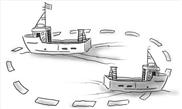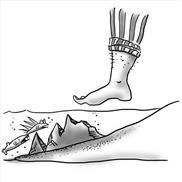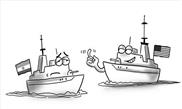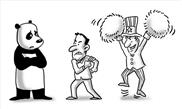Ambiguity helpful in S.China Sea disputes
Recent years have seen increasing wrestling, both overt and covert, around the South China Sea disputes. With the US moving out of shadows into the spotlight, the tension between Beijing and Washington exacerbates.
Beijing has case for 'historic rights' at sea
It is equally erroneous on the part of Manila and Washington to claim that from a procedural standpoint the UNCLOS is comprehensive in scope and that Beijing cannot derogate from the Convention's provisions on such matters by claiming “historic rights” under a separate head of general international law.
Obama raises S.China Sea tensions to consolidate diplomatic legacy
Countries sincerely hoping for peace do not want to see this. What about the US?
Japan's S.China Sea policy lacks foundation
On the part of Beijing, Japan is not a claimant of the South China Sea, hence its frequent meddling in the region undoubtedly exposes its malevolence.
No more ship-grounding tricks allowed in South China Sea
The Chinese foreign ministry confirmed Wednesday that China had towed away a foreign ship that was grounded on Wufang Jiao in the South China Sea. For safety concerns, China urged nearby fishing ships to leave.
US sea meddling makes trouble for itself
The US, a nation that aspires to defend its global leadership amid economic and strategic transformation, is unwilling to pay much of a price.
S.China Sea patrols bring no benefit to India
If New Delhi chooses to follow in the US footsteps, it means the country is taking part in US “pivot to Asia” strategy and adopting a major strategic shift.
US advances rebalance strategy by provoking Hanoi over Xisha
The recent two provocations in the Xisha Islands is an attempt by the White House to instigate Beijing-Hanoi tensions.
US must restrain from militarizing sea
What does the US want?
Military factors injected by US provocation in the South China Sea
The US, an outsider, has injected the most military elements in the region.
Tribunal's award in Philippines' case turns blind eye to facts
Today I will comment on the Award concerning the Philippines' remaining Submissions 8-9, 12 and 14.
No dispute over China's historical rights
No matter what happens, the fundamental problem remains. No dispute can be reflected by the Philippines' (but not the Tribunal's) Submission 5, which should have been barred from entering the merits phase. According to the non ultra petita principle declared by the ICJ in the Asylum Case the Tribunal has a duty to abstain from deciding points not included in the submission.
Sovereignty issues invalidate award
Obviously, no matter whether Ren'ai Jiao itself within Nansha Islands is a rock or an LTE, what happens there is a matter of sovereignty, the condition under Article 297(1)(c) is unfulfilled. It is unjustified for the Tribunal to take jurisdiction over submission 11 concerning the environmental issue occurring in Ren'ai Jiao, even if considered an LTE.
Jurisdiction award in S.China Sea case wrong
Based on the foregoing, the Tribunal is advised to declare in the award on merits that, upon further examination, no dispute can be crystallized by the formulation of Philippines' submissions 3-4 and 6-7, and thus bravely end the embarrassment and a process started erroneously.
US provocations serve multiple purposes
The US flexes its muscles against China at this time for some purposes.
South China Sea will determine how close Hanoi gets to Washington
Hanoi is also clear that it is impossible to counterbalance one country by entirely depending on another. This is the lesson it has already learned from history.
Hyping up airfield disrupts peace in S.China Sea
China has reiterated that the newly built reefs and islands are mainly for civilian use. Instead of drawing support from external powers, the regional nations might wait and see whether China will keep its word.
S.China Sea airfield will boost navigation safety, aid maritime research
China has always upheld and practiced a policy of peace and development. The airfield shouldn't be a cause of concern for anybody.







